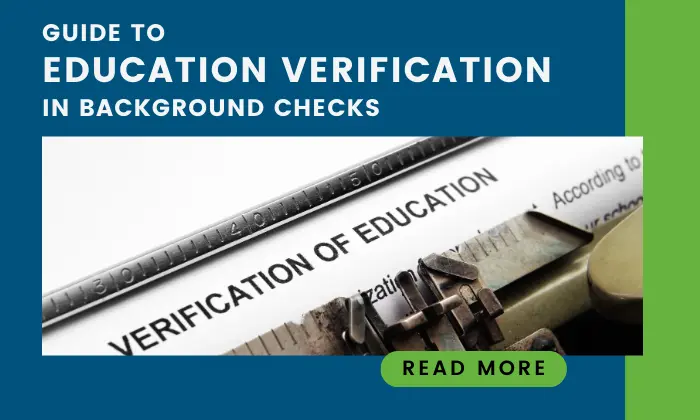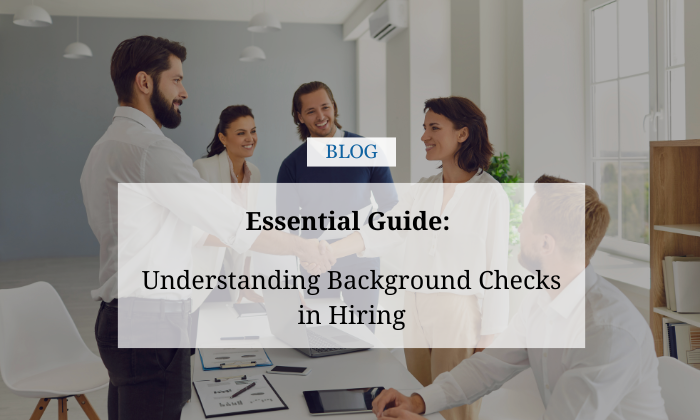Education verification, as a crucial component of background checks, has become indispensable in today’s competitive job market. Organizations across industries recognize the significance of conducting thorough background checks to make informed hiring decisions that contribute to building strong and successful teams. With the rise in instances of resume fraud and misrepresentation, employers must prioritize the verification of education credentials. This ensures that they select candidates who genuinely possess the qualifications they claim.
Understanding Education Verification
Education verification is an essential process employed during background checks to authenticate and validate an individual’s educational qualifications and achievements. Its primary purpose is to ensure that the information provided by candidates regarding their educational background is accurate and truthful. By conducting education verification, employers can make informed decisions based on reliable data, ensuring that they hire candidates who possess the necessary skills and knowledge for the job.
Education verification matters for several reasons. Firstly, it helps employers avoid costly hiring mistakes by uncovering any discrepancies or misrepresentations in education credentials. By verifying the educational qualifications, employers can be confident that the candidates they hire have the requisite expertise to perform their roles effectively.
Unfortunately, misrepresentations in education credentials are not uncommon. Candidates may exaggerate their academic achievements or even present entirely fabricated qualifications. These misrepresentations can undermine the credibility of both the candidate and the hiring process. By conducting education verification, employers can identify and address any discrepancies, ensuring that they are making informed decisions based on accurate information.
The Process of Education Verification
The process of education verification is a systematic and crucial step in background checks. It involves verifying and validating the educational background and credentials of a candidate. The process begins by obtaining the candidate’s consent to conduct the verification, ensuring compliance with privacy and legal requirements. Once consent is obtained, the next step is to gather the necessary information, including details about educational institutions attended, degrees earned, dates of attendance, and other relevant information. This information serves as the foundation for the verification process.
The next phase involves contacting the educational institutions directly to confirm the candidate’s educational claims. This typically includes reaching out to the registrar’s office or the relevant department to request verification of the candidate’s degree, attendance records, and GPA. Various methods are used for verification, such as degree verification, attendance verification, and GPA verification. These methods help authenticate the candidate’s educational qualifications and achievements. It’s important to note that the timeline and challenges in education verification can vary depending on factors like the responsiveness of educational institutions and the complexity of the candidate’s educational history.
Benefits of Education Verification in Background Checks
Education verification in background checks offers numerous benefits for employers. The following are the benefits of Education Verification in Background Checks:
1. Ensuring Candidate Credibility: One of the key benefits of education verification in background checks is the ability to establish candidate credibility. By verifying the accuracy of a candidate’s educational claims, employers can ensure that they are hiring individuals with genuine qualifications and achievements. This process helps build trust and confidence in the hiring decision, reducing the risk of hiring unqualified or misrepresented candidates.
2. Validating Academic Achievements: Education verification plays a vital role in validating the academic achievements of candidates. By confirming the accuracy of their degrees, attendance records, and GPA, employers can ensure that candidates possess the qualifications they claim. This process helps in selecting highly qualified individuals who have the necessary knowledge and skills for the job.
3. Mitigating Risk and Avoiding Hiring Mistakes: Education verification in background checks serves as a crucial tool in mitigating risk and avoiding costly hiring mistakes. By thoroughly verifying the educational qualifications of candidates, employers can minimize the risk of hiring unqualified individuals or those who have misrepresented their educational background. This process helps ensure that candidates possess the necessary skills and knowledge to perform their roles effectively.
4. Maintaining Regulatory Compliance: Education verification in background checks plays a significant role in ensuring regulatory compliance for organizations. Many industries have specific regulations and standards that require employers to verify the educational qualifications of their employees. By conducting education verification, employers can demonstrate their commitment to upholding these regulations and maintaining compliance. This process helps organizations avoid potential legal issues and ensures that they are hiring candidates who meet the necessary educational requirements for their respective roles.
Best Practices for Conducting Education Verification
Conducting education verification in background checks requires adherence to best practices to ensure accuracy and reliability. Here are some key guidelines:
- Obtain Consent: Always obtain written consent from the candidate before initiating the education verification process. This ensures compliance with privacy and legal requirements.
- Gather Comprehensive Information: Collect all relevant details from the candidate, such as institutions attended, degrees earned, dates of attendance, and any other pertinent information. This comprehensive data serves as the basis for verification.
- Contact Educational Institutions Directly: Reach out to educational institutions directly to verify the candidate’s educational claims. Contact the registrar’s office or relevant department to request verification of degrees, attendance records, and GPA.
- Verify through Official Channels: Rely on official channels for verification, such as official transcripts, enrollment letters, or direct communication with authorized personnel at educational institutions. Avoid relying solely on self-reported information.
- Utilize Professional Verification Services: Consider engaging professional verification services to conduct thorough and accurate education verification. These services have experience and expertise in navigating potential challenges and ensuring reliable results.
- Maintain Timely Communication: Establish open lines of communication with educational institutions to expedite the verification process. Promptly respond to any requests for additional information or documentation.
- Document the Verification Process: Maintain detailed records of the education verification process, including correspondence, responses, and any discrepancies found. These records serve as evidence of due diligence and can be useful for future reference.
Legal Considerations in Education Verification
When conducting education verification in background checks, employers must be mindful of legal considerations to ensure compliance and protect the rights of candidates. Here are some important legal aspects to consider:
- Consent and Privacy: Obtain written consent from candidates before initiating education verification. Respect candidate privacy and comply with relevant data protection laws when handling and storing personal information.
- Anti-Discrimination Laws: Ensure that education verification practices do not discriminate against candidates based on protected characteristics such as race, gender, religion, or disability. Treat all candidates fairly and apply verification standards consistently.
- Verification Sources: Use reputable sources for verification, such as official transcripts, enrollment letters, or direct contact with educational institutions. Avoid relying solely on unofficial or non-accredited sources.
- Confidentiality: Safeguard the confidentiality of candidate information obtained during the verification process. Limit access to sensitive data and ensure that it is stored securely to prevent unauthorized disclosure.
- Accuracy and Documentation: Strive for accuracy in education verification and maintain proper documentation of the process. Document all communication, responses, and any discrepancies found. This documentation serves as evidence of due diligence and compliance.
- Compliance with Fair Credit Reporting Act (FCRA): If using a third-party verification service, ensure compliance with FCRA regulations, which govern the use of consumer reports for employment purposes. Understand your obligations as an employer and follow the necessary procedures for obtaining and using verification reports.
- Local Jurisdiction: Familiarize yourself with relevant local, state, and federal laws governing education verification practices. Different jurisdictions may have specific requirements or restrictions that must be followed.
Challenges and Limitations of Education Verification
While education verification is an essential part of background checks, it is not without its challenges and limitations. Here are some common factors to consider:
- Availability and Responsiveness of Educational Institutions: Some educational institutions may have limited resources or slow response times, which can delay the verification process. Obtaining timely and accurate information can be challenging, especially when dealing with international institutions or with complex administrative procedures.
- Incomplete or Outdated Records: Educational institutions may have incomplete or outdated records, particularly for candidates who attended many years ago. This can make it difficult to verify specific details, such as dates of attendance or specific courses taken.
- Variations in Verification Standards: Different educational institutions may have different verification standards or processes. Some institutions may provide more detailed information than others, leading to inconsistencies in the level of verification obtained for different candidates.
- Verification Limitations: Education verification primarily focuses on verifying the information provided by candidates. It may not uncover cases of diploma mills or fraudulent qualifications that are not detectable through regular verification channels.
- False Information or Misrepresentation: Candidates may intentionally provide false information or misrepresent their educational background. Despite verification efforts, there is always a risk of encountering individuals who attempt to deceive employers by fabricating their academic achievements.
- Limited Scope of Verification: Education verification typically focuses on degrees earned, attendance records, and GPA. It may not delve into other aspects of a candidate’s educational experience, such as certifications, specialized training, or non-traditional forms of education.
- Professional Verification Services: Relying solely on professional verification services can be costly for some organizations, especially when dealing with a large volume of candidates. Balancing the need for thorough verification with budget constraints can be a challenge.
Despite these challenges and limitations, education verification remains a valuable tool for assessing the credibility and qualifications of candidates. It helps organizations make more informed hiring decisions and reduces the risk of hiring unqualified or misrepresented individuals.
Conclusion
Education verification is a vital aspect of background checks in the hiring process. Throughout this guide, we have explored the significance of education verification, its role in ensuring candidate credibility, and the benefits it brings to employers. We have discussed the necessary steps, including obtaining consent, gathering information, contacting educational institutions, and utilizing various verification methods. Additionally, we have highlighted the legal considerations, challenges, and limitations involved in education verification.
By implementing education verification practices, employers can make informed decisions, mitigate risks, and build a reliable workforce. Validating candidates’ educational achievements promotes transparency, reduces the risk of hiring unqualified individuals, and helps maintain regulatory compliance.
As organizations continue to prioritize hiring top talent, education verification serves as a crucial tool for assessing candidates’ qualifications. In summary, education verification is a key element in the background check process that contributes to the overall integrity of the hiring process.
Securecheck360
Education Verification targets for Date the degree was awarded, Diploma or Degree, Major, and Dates of attendance. Securecheck360 has in-house verifiers contacting schools to reduce the turn-around time and improve accuracy. Verifiers will utilize database search if not available upon direct contact or reach out to the institutes for confirmation.
To know more about our services, book your free demo today!







